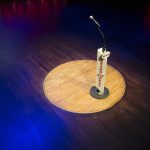With the death of Nashvillle legend Little Jimmy Dickens on January 2, 2015, at 94, an important era of country music history has passed into history. Dickens was the last surviving member of the Grand Ol’ Opry connected so closely to the founding members of the legendary show. For decades, members who survived the golden era of the Grand Ol’ Opry remained active on the weekly show along with Dickens, including Roy Acuff, Minnie Pearl, and Ernest Tubb.
Born in West Virginia in 1920, James Cecil Dickens joined the Grand Ol’ Opry in 1948 after country music elder statesman and innovator Roy Acuff heard him on the radio in Saginaw, Michigan. He was the oldest member of the Opry, remaining active well into 2014. He is credited with bringing the rhinestone look to the country music stage. His first hit single was “Take an Old, Cold Tater (and Wait).” The humorous song became a trademark, inspiring Hank Williams to nickname him “Tater.” It’s a name that stayed with him throughout his career. Although he was considered the comic end of Opry and country music, his influence and inspiration was in how he kept the pure country music of his roots intact, transcending trends and fads, and the utter sincerity of his humor.
An example of this can be found early on, when, while on tour in an Opry package show, Dickens inspired Hank Williams to write “Hey Good Lookin.” As legend has it, Williams wrote the song for Dickens in 20 minutes on the tour bus. After Williams decided to record the song himself, he later quipped that the song was just too good for Dickens.
Dickens’ biggest hit came in 1965 with “May the Bird of Paradise Fly up Your Nose.” The song went to number one on US country charts and crossed over to the top 20 on pop music charts. It also won him the attention of The Tonight Show, where he appeared as a guest of Johnny Carson numerous times over the decades.
In 1982, Merle Haggard heard Dickens sing an unfinished song, “Shopping for Dresses.” Haggard finished the tune and it was included on Haggard’s classic album, Go Where the Lonely Go. He is also notably credited with discovering Marty Robbins in Phoenix, Arizona in 1950, while on an Opry national tour.
In his final years, in addition to hosting the Grand Ol’ Opry multiple times, Dickens was included in bonus comedy tracks on country star Brad Paisley’s albums and videos. Along with George Jones and Bill Anderson, the group became known as the Kung Pao Buckaroos.
With respect to his performances and recordings, Dickens holds distinction in his ability to bring an insider’s humor to country music, too often stereotyped with misfired and inaccurate humor by the culture-at-large.
As a country music singer emphasizing humor, he gave a solid foundation for other artists to come, including Shel Silverstein and Roger Miller. A natural heir to Dickens’ approach, Miller ironically broke through country and pop charts in 1965, the same year Dickens’ song, “May the Bird of Paradise Fly Up Your Nose” was a cross-over hit.
Dickens’ also demonstrated the secret to good comedy that often has eluded other country music acts: he was dead serious and sincere in delivery. This gave each performance a double punch of humor laced with hillbilly sincerity. Most importantly, while his songs were humorous, making them easy to be taken lightly, he made genuinely good country music. It was not only his stature that marked his legend, but his consistent and faithful Opry performances filled with fine music, humor, and a natural entertaining flare for pleasing generations of country audiences. Little Jimmy Dickens will be missed both as an artist who distinguished himself, and as out last connection to so many great country music legends.




